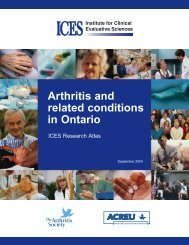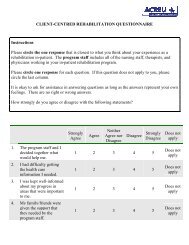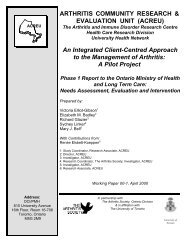Client-Centred Rehabilitation - Arthritis Community Research ...
Client-Centred Rehabilitation - Arthritis Community Research ...
Client-Centred Rehabilitation - Arthritis Community Research ...
Create successful ePaper yourself
Turn your PDF publications into a flip-book with our unique Google optimized e-Paper software.
28<br />
expertise. Rehab specialists don’t<br />
know that much. MS #1<br />
Participation in decision-making and goal<br />
setting<br />
When clients talked about positive<br />
experiences with rehabilitation they usually<br />
referred to situations in which they were<br />
actively involved in collaborative decisionmaking<br />
with staff.<br />
“So I had a great experience. The<br />
next meeting they forewarned me<br />
and then reminded me that it was<br />
going to be a goal-oriented session<br />
and that if there were any services<br />
that I deemed necessary for myself,<br />
please feel free to provide that<br />
information” ABI #1<br />
Much of this individualization referred to<br />
goal-setting specific to the client’s needs and<br />
wants.<br />
“What was excellent about it was<br />
that she catered not to the general<br />
rule but she was specific about my<br />
situation. All of us are different and<br />
brain injury is not going to be the<br />
same for the next person.” ABI #1<br />
<strong>Client</strong>s were less satisfied when they<br />
encountered situations where they felt they<br />
were being labeled or their outcome prejudged<br />
on the basis of their diagnosis alone<br />
with no consideration of their individual<br />
needs.<br />
“But the physiotherapy wasn’t<br />
[client-centred] for a long<br />
while….she basically said that<br />
somebody with my injury had a low<br />
probability of walking so that’s what<br />
she assumed was going to happen [to<br />
me], without trying to build me up so<br />
that I could walk. SCI #1<br />
“…they had certain guidelines that<br />
your knee should bend to a<br />
maximum of 100. That was for<br />
everybody. That’s the ideal. But<br />
hey, if my knee will bend to 75 and I<br />
can walk, I’m happy. Now take a<br />
look at the individual person and<br />
what their needs are.” ARTH #3<br />
Routinized programs or group work were<br />
not usually perceived to be associated with<br />
individualized goal setting.<br />
“But once you’re in therapy, they<br />
don’t say, ‘How about you sit down<br />
and we’ll talk about what you can<br />
and cannot do, what you would like<br />
to do’. They say, ‘This is your<br />
program. This is what you do.” MS<br />
#1<br />
Participation in goal setting was positive if<br />
the client fit into the mold that the program<br />
provided.<br />
“When I came…they asked me to<br />
choose three objectives. I said, I<br />
want to be able to shower, they said,<br />
we can fix that…I want to be able to<br />
walk upstairs, they said we can fix<br />
that…and I want to be able to work<br />
in the garden, they said we can fix<br />
that.” COPD #1<br />
Participants reported more difficulties when<br />
their goals did not match those of the<br />
program.<br />
“…it’s a combination of not seeing<br />
the vision or maybe we’re not<br />
communicating. Although wanting<br />
to walk or wanting to get back to<br />
where you were the day before your








